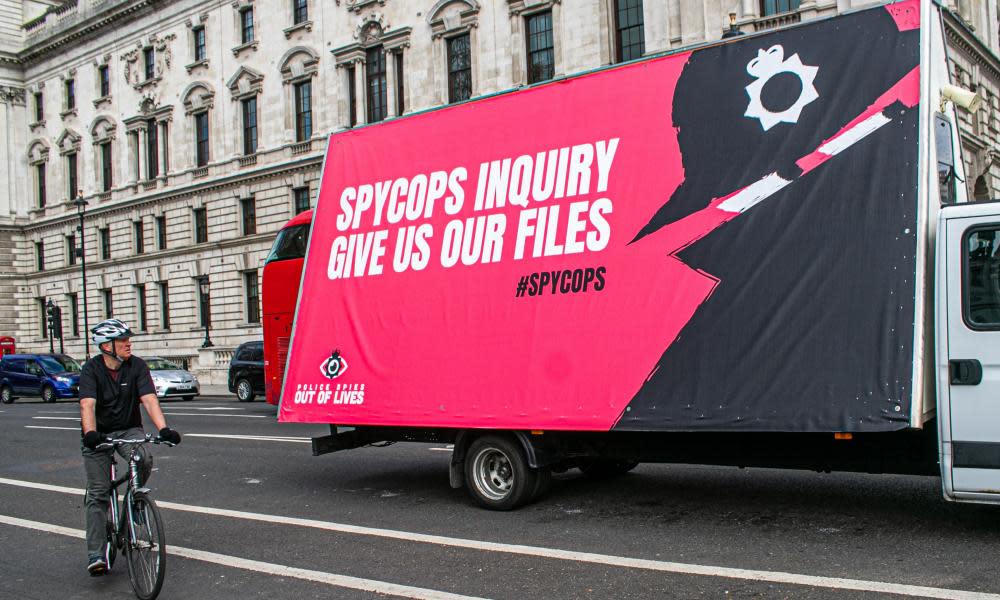‘Spy cops’ operations against leftwing groups unjustified, inquiry finds

Undercover police operations to infiltrate leftwing groups in the 1970s and early 1980s were not justified and should have been rapidly closed down, a retired judge leading a public inquiry has concluded.
In a critical report published on Thursday, Sir John Mitting found that undercover police officers collected a “striking and extensive” amount of information about the personal lives of political activists, such as their holiday plans, sexuality and bank accounts.
He also concluded that the undercover officers gathered a “remarkable” quantity of information on activists who posed no threat to public order.
Related: ‘Spy cops’ scandal: what is it and why was public inquiry set up?
The report contains the first conclusions of the long-running inquiry, which is examining the operations of police spies over more than four decades. It covers the first 14 years of the secret operations, between 1968 and 1982.
The much-delayed inquiry was set up in 2014 after a stream of revelations about the misconduct of the undercover officers. These included spying on the family of the murdered teenager Stephen Lawrence and deceiving women into long-term sexual relationships.
Mitting said at least six undercover officers had sexual relationships with women during their covert deployments between 1968 and 1982. The former high court judge said he believed one of the women who had accused an officer of lying about the extent of their relationship.
Between 1968 and at least 2010, 139 undercover officers were sent on deployments – usually lasting four years – and spied on more than 1,000 mainly leftwing and progressive groups.
The officers adopted fake personas and pretended to be activists while infiltrating political movements, such as campaigns against racism, apartheid and the Vietnam war.
In his report, Mitting concluded that the Scotland Yard undercover unit, the Special Demonstration Squad (SDS), operated with the approval of the highest levels of government, and funding from the Home Office. Its reports were routinely passed to MI5, the Security Service.
Mitting said he had “come to the firm conclusion” that the intrusive methods of the undercover officers were not justified, adding that if their operations had “been publicly known at the time, the SDS would have been brought to a rapid end”.
Mitting said there were four questions about the methods used by the undercover officers that senior officers at Scotland Yard and the Home Office ignored.
“If these issues had been addressed, it is hard to see how any conclusion could legitimately have been reached which would not have resulted in the closure of the SDS.”
These included the controversial technique of stealing the identities of dead children to bolster the alter egos of the undercover officers and the practice of the undercover officers taking up senior posts in the groups they were infiltrating.
He said that the unit’s infiltration of only three groups – (Provisional) Sinn Féin and two unidentified organisations – were justified on the grounds that they posed a threat to the safety of the state. “The great majority of deployments by the SDS in this period” were not justified, he said.
One undercover officer, Vincent Harvey, had told the inquiry that he had four “one-night stands” with women while he was infiltrating the Socialist Workers party between 1976 and 1979.
A woman, known only as Madeleine, challenged his account during the hearings. She testified that she had a relationship with him that actually lasted two months. In his report, Mitting concluded that he believed her evidence was “true and, where it conflicts with his, is to be preferred”.
After the report was published, Madeline said: “Harvey lied, hoping it would never come out 40 years later. Unfortunately for him, I came forward, and the chair believed me over this very senior police officer. How many lies have been told by other officers, whose victims were unnamed and unknown?”
Mitting said the sexual relationships that the spies formed with women “was to become a perennial feature of the SDS throughout the remainder of its history”. It was closed down in 2008.
He said he would make public his conclusions on the issue of the sexual relationships that occurred between the mid-1970s and 2010 in a later report.
The officers helped to compile secret files on campaigners, recording, for instance, weddings and childcare arrangements as well as spying on children. Once, they recorded how a 17-year-old spent a “lot of his spare time” at his girlfriend’s home.
Commander Jon Savell of the Metropolitan police, said: “We know that enormous distress has been caused, and I want to take this opportunity to reiterate the apologies made to women deceived by officers into sexual relationships, to the families of deceased children whose identities were used by officers, and to those who suffered a miscarriage of justice because of the actions of SDS officers.”
Mitting will now hold hearings that examine the undercover operations from 1982 until the present day.

 Yahoo News
Yahoo News 
